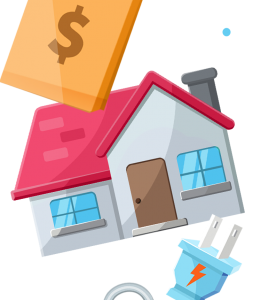Rental Agreements and Homeowner’s Associations
When you rent an apartment or house, what you can do with your new home is dictated by your Lease Agreement. A Lease Agreement specifies not just how much you pay in rent, but dozens of other restrictions on what you can do, when, and what your landlord can do to enforce it.
Reading and understanding your lease agreement is an essential part of moving into a new place, as it will include all kinds of hidden fees, services, and expectations between yourself and your landlord. The essential components of a lease include:
Rent and Fees
This is usually the first thing to check on any lease – how much are you paying in rent? This was probably included in the listing that got you interested in renting that place to begin with. However, you should pay attention to see if there are other fees added. Some of the most common fees include:
Late Fees
If you pay after a specified “due date”, you have an additional fee added to your bill. Late fees are illegal in some states, but landlords found an easy way to get around this. Instead of charging a “late fee”, they just increase your rent, and offer an “on-time payment discount”.
Service Fees
Sometimes renting a place will include some other perks, like a parking space, snow removal, heating/electricity, or internet access. Your landlord may include provisions in the lease saying that you will be paying an extra fee for these services on top of your rent. Keep an eye out for these kinds of extra fees before you sign.

Behavior Fees
Your lease agreement will have a long list of things you are and are not allowed to do. If your landlord finds that you break the rules, they will often include a specific fee for breaking each type of rule.
Security Deposit
Your lease will often specify how much money needs to be set aside as a security deposit when you first move in. Security deposits are theoretically held to cover damage and expenses or missed rent payments after you move out. Some states do not allow security deposits, and many landlords will credit your security deposit to your rent after a certain amount of time. Your lease agreement will specify this exactly.
Occupancy Rules
Your lease will also have specific rules about how many people can live in the place you’re renting. Almost every lease agreement puts a hard limit on how many people can live there. Many will also require that every person who lives with you be registered with the landlord. They may have the right to do background checks and reject the right for that person to move in. Your lease will also have specific provisions on “sub-leasing”, where you rent out a room or list your place for rent while you are away. It is becoming more common for landlords to disallow sub-leasing entirely.
Almost every agreement also includes a provision on whether you can have pets, and what kind of pets are allowed. Having pets usually involves an additional security deposit, that your pets be registered with your landlord, and they are current on vaccinations. Landlords may “make exceptions” and allow you to keep a pet even if the lease agreement says otherwise, but this is always risky because your landlord can change their mind at any time.

Maintenance Rules
Your landlord is responsible for maintaining essential systems in the apartment you rent (such as leaks, faulty plumbing, and wiring, etc.), but that does not mean they cover everything. Your lease will also include provisions of what they do NOT cover, like damage that might be partially your fault.
It’s also common for an apartment to come with a refrigerator, microwave, or other appliances, but the lease explicitly specifies that there is no warranty on these devices. In this case, if your refrigerator breaks, it would be your responsibility to replace it (which also means you can take it with you when you move out). Your lease will put explicit provisions on what your landlord covers and what is your responsibility.
Your lease agreement will likely include a clause about the right for your landlord to inspect your property to identify if you are keeping it maintained in line with the agreement. This clause is extremely important to read and understand carefully, as it could include the right for your landlord to access your apartment or home at any time without prior consent. This has caused many “horror stories” with unethical landlords.
Homeowner’s Associations
While a lease agreement covers rentals, owning your home does not mean you do not need to follow rules like these. All condos, and most homes in urban/suburban areas, are part of what is called a “Homeowner’s Association”. This is a community agreement for shared maintenance costs (like roof repairs in a condo, or sidewalk maintenance in a subdivision).
Homeowner’s Associations have their own rules for the community and fines, which can be just as lengthy and complicated as an apartment rental agreement. The biggest difference is that as a homeowner, you can vote on who runs your homeowner’s association and can have a greater say in changes to these rules.
Pop Quiz
This quiz has questions relating to the terms of a sample lease, which you can find by clicking here.